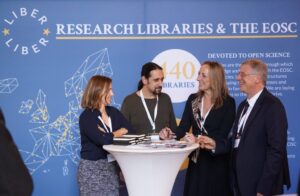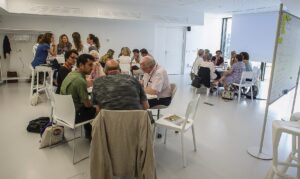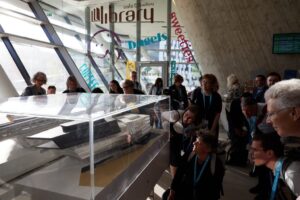LIBER Strategy Update: 2018 Achievements & Activities
One year ago, LIBER launched its 2018-2022 Strategy: an ambitious plan to help research libraries meet the needs of a rapidly changing research landscape.
To do this, our strategy focuses on positioning research libraries as: 1) Platforms for Innovative Scholarly Communication, 2) Hubs for Digital Skills & Services and 3) Partners in Research Infrastructure.
In this post, we report on what’s been achieved in the past 12 months and outline our priorities for 2019. But first, many thanks to our wonderful network of librarians, directors, policy specialists, leadership experts and others who have worked so hard on the reports, factsheets, workshops and activities outlined below.
Without you — our community of libraries, partners and supporters — we would never have achieved so much.
As always, we invite you to be directly involved in LIBER’s work. Our Working Groups are the driving force behind many of our activities, and are open to staff working at any level, in any LIBER library. We also advance issues important to research libraries through our funded projects.
If you have thoughts on LIBER and its activities, please share them directly with the LIBER office or anonymously via our 2018 Satisfaction Survey.
Expanding LIBER’s Community
We welcomed 15 libraries to LIBER’s community in 2018, bringing our network to 440 libraries across Europe. In addition, 22 new people joined our Working Groups. Thank you to our incredible 171 volunteers, serving on our nine Working Groups, Executive Board and the Conference Programme Committee.
New LIBER Libraries: AECC University College Library – Borås University Library – Hasselt Limburg Library – IST Austria Library – Library, Jönköping University Library – National University of Ireland Galway – Max Planck Digital Library – National Library of Greece – Paris Observatory Library – RCSI Library – Royal Library of Belgium – Universitat Autonoma de Barcelona Library Services – University Library of the Free University Berlin – University Library, University of Corsica Pascal Paoli – University Library of Poitiers.
Promoting Open Science
Open Science was reflected in many of our core activities this year. We made it the theme of our 2018 Annual Conference, produced an Open Science Roadmap (downloaded over 1,100 times since July) and demonstrated the importance of research libraries to the European Open Science Cloud.
In addition to our own initiatives, we are active in the Open Science debate through our role in projects. For example, we organised an Open Science Trainer Bootcamp and participated in the creation of the Open Science Training Handbook as part of the FOSTER project. LIBER is also a partner in the EOSCpilot project.

Making Libraries Heard on Copyright
In 2018, our Copyright & Legal Matters group worked tirelessly on proposed reforms to European copyright law. Their dedication was instrumental in securing a Europe-wide right to practice Text and Data Mining (TDM) for universities and research bodies. They continue to work on improving the proposals, recently signing an open letter calling for TDM laws which benefit businesses as well as academics, and raising the potential negative impact of the proposals on the Digital Humanities. In addition, the group has issued a position statement to MEPs on proposed amendments to the Reuse of Public Sector Information Directive, which brings research data from universities into scope for the first time.
Building the Skills of Library Staff
Which digital skills do librarians need to develop? This question is at the heart of efforts by our new Digital Skills for Library Staff & Researchers group. They tackled this topic at a LIBER 2018 workshop, together with the FOSTER project, and will explore it further with a webinar on 14 December: Skills and Training in Open Science and the EOSC ecosystem.

Our well-established Leadership Programmes group also played their role in training, through the successful completion of the fourth edition of our Emerging Leaders programme. The 27 graduates of this year’s programme are now ready to move forward in their careers, applying their newfound knowledge for themselves and the LIBER libraries for which they work. In total, the programme now has 80 alumni and many attended a special reunion during our 2018 Annual Conference. Applications for the 2019/2020 edition of this successful training course will be launched shortly. The Working Group also launched the Job Description Marketplace in 2018, and will be extending this in 2019.
Here they are: this year’s graduates of our Emerging Leaders programme at @LILLIADlci. Well done everyone! #liber2018 #leadership #libraries pic.twitter.com/P4NYk5ORgr
— LIBEReurope (@LIBEReurope) July 3, 2018
Publishing Practical Recommendations
Many of the work done by our groups in 2018 focused on practical advice for libraries, among them recommendations on implementing innovative metrics from our Innovative Metrics group, a popular set of Digital Humanities Reading Lists from our Digital Humanities & Digital Cultural Heritage group, and a factsheet on Implementing FAIR Data Principles & The Role of Libraries from our Research Data Management (RDM) group.
Practical tips for libraries looking to lead the Open Access transformation were also included in this and there are many ways to do so! That premise formed the basis for the LIBER 2018 workshop, organised by our Open Access group. In addition, this group shared Open Access insights through interviews with Open Access practicioners Paola Gargiulo and FineLib. It is also notable that the 5 Principles for Open Access Negotiations, drafted by the group in 2017, continue to be picked up by many organisations, most recently Swiss universities and all Nordic consortia.
Finally, for libraries looking to implement Federated Identity Management, the LIBER Office published a blog post outlining the benefits and how to get started, as part of our role in the AARC2 Project.
Focusing on Research Data Management
Our very active RDM group was the driving force behind many LIBER webinars in 2018, focusing on topics such as data literacy, data stewardship and FAIR Data. In addition, their LIBER 2018 workshop focused on Data Science in Libraries and they launched a Data Management Plan Catalogue (which will be further extended in 2019).
Discussing Library Architecture
The highly successful 19th Seminar of LIBER’s Architecture Group (LAG) — held in the Zaha Hadid library at the WU Vienna — took place in April and all presentations can be found here. The LAG group is now working on the 20th seminar, to be held at the spectacular new library at the University of Luxembourg in April 2020.

Coming Up: Surveys, Case Studies, Best Practices & New Projects
For next year, several surveys are being planned. The Digital Humanities & Digital Cultural Heritage group will expand on its mini survey of DH in European research libraries by releasing a broader survey for February, the results of which wil be presented at LIBER’s 2019 conference in Ireland.
Also in 2019, the RDM group will release the results of its survey on the FAIRness of repositories. Similarly, our Linked Open Data group will shortly be asking LIBER libraries to share how they have released Linked Open Data and the resources they’ve used to do that. At the same time, the Linked Open Data group is working on a set of best practices for releasing Linked Open Data.
Case studies are being planned by two groups. The RDM group will collect case studies on research data services with a disciplinary focus and the Digital Skills group will publish a series of interviews focusing on Open Science skills training programmes for library staff and researchers. If you know of a programme which should be featured, please get in touch.
Finally, LIBER will start work on SSHOC early next year: a new project to create a European open cloud ecosystem for social sciences and humanities (SSH). We are also actively working with partners across Europe and beyond to investigate opportunities for new projects to add to the LIBER portfolio.
Related news articles